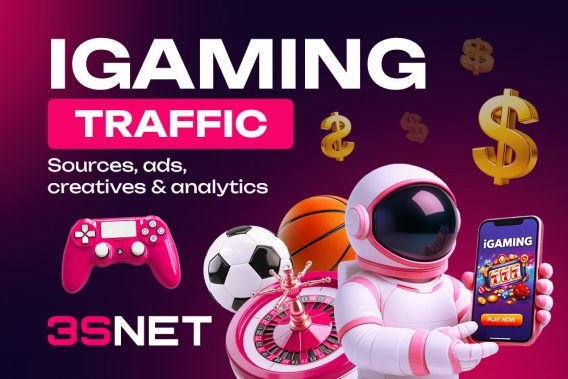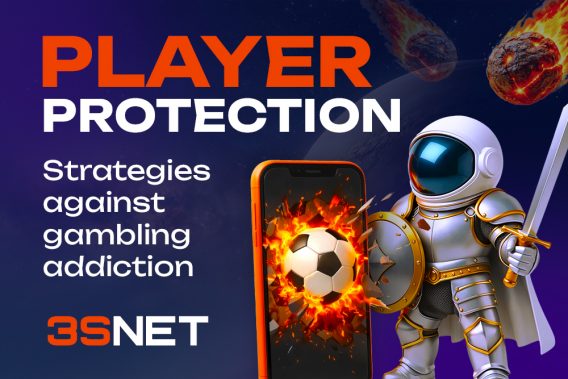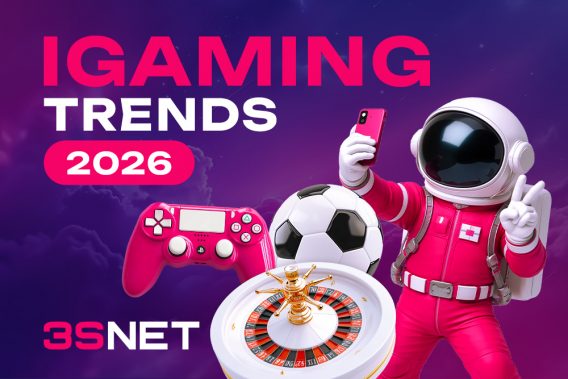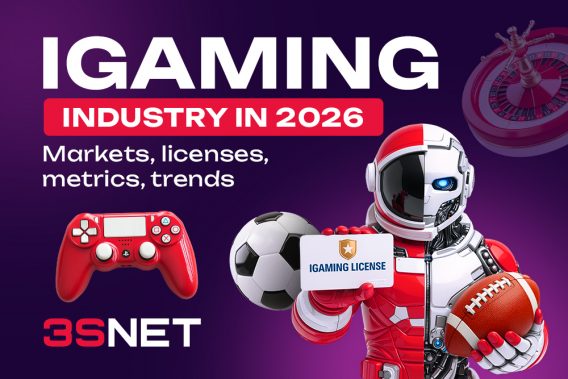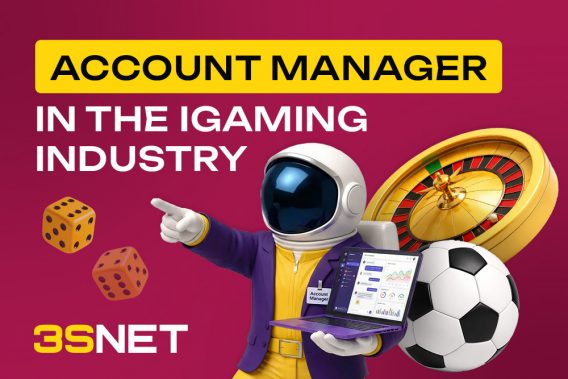
Publication date: 28 October 2025
What is true success and how to achieve it? How to inspire and lead a team? What should burn inside a true leader? And the most honest prediction from “Baba Vanga” of the iGaming industry. Get ready for the 3S.INFO iGaming Heroes series with Dmitry Sergeev, a man with immense knowledge and expertise, who is ready to share it all openly!
– Dmitry, your path has been marked by numerous awards. We counted ten on your Wikipedia page, ranging from Best Media Manager to Top Manager in the betting industry. Tell us, how have you managed to stay at the top all these years?
– Yes, that’s a good question. To be honest, it all depends on the projects you’re involved in.
Thanks to my colleagues and staff. Their merit.
There have been ups and downs — far from all projects took off. Let’s be honest: failures are usually not talked about, but there have been plenty of those too. Some endeavors succeeded, and they received awards. Our PR colleagues presented them nicely, did a great job. In other cases, on the contrary, there were “anti-awards”. That’s where I got criticized by partners or shareholders.
So, I can’t say I’m always at the peak or that everything works out for me. That’s not the case. When a project takes off, it’s usually because you’re deeply involved in it yourself. You understand what it’s missing, how it should work, what internal business processes are involved, and what goal it’s aiming for. If you have that understanding, then you achieve a result that can be recognized with an award. But if you let go, pass the idea to others, explain what needs to be done, but don’t personally guide the project further — that’s often when things don’t turn out as planned.
So, success isn’t just about the idea, it’s about involvement. If you don’t keep your finger on the pulse, the project falls apart.
– Which project helped you grow the most professionally, managerially, and personally? And based on your feelings, where did you really feel like you’ve grown, felt like you were at your best?
– It depends on what aspect we’re talking about. Each project teaches you something new. Skill development, management, process organization, back-office operations, and relationships with peopleю So, all of these areas constantly evolve no matter where you work.
However, if we focus specifically on professional growth, each industry forces you to learn again from scratch. When I came to iGaming, I only knew sports betting and had no clue about casinos. Over the past year, I’ve deliberately pushed myself to study this area, enhance my skills, and fill in any gaps in knowledge.
It’s hard to be an expert in everything. However, to develop a broad business perspective, you need to listen, ask questions, verify information, and observe. It’s unfortunate that such skills aren’t taught formally. Instead, you have to learn on phone calls, meetings, and interactions with people who know more than you do. You listen, analyze, ask questions, compare. Gradually, a picture begins to form.
Speaking personally, definitely Parimatch first, followed by PARI. What we achieved between 2019 and 2022 was enormous. Then came the story of PARI. For nearly 30 days, our deposit intake was shut down, and we lost approximately 80% of our audience. But we rose from the ashes like a Phoenix, reaching three times the level of Parimatch. Just recently, I handed over PARI to my colleagues and started writing my new chapter. I consider the achievements of PARI significant and massive. And I’m proud of both myself and the team that stood by me throughout this journey.
Going way back, there’s Championat. Building it from zero to become the number one sports media outlet in Russia’s internet landscape was impressive.
I led, sustained, and improved the economy, but didn’t achieve anything truly remarkable at that time. No awards were given for those efforts either — everything was fair and square.
– If not iGaming, then what? What field could you have found fulfillment in if you hadn’t entered the gambling industry?
When you understand sports, you know how to sell it. But if you just hang a logo for show, it won’t yield any benefits.
A better question would be: if not sport, then what? After all, the success of Russian bookmakers was primarily linked to deep knowledge of sports and understanding of sports itself. This is difficult to acquire later in life. If you haven’t fallen in love with sports — not just as physical activity, but as a lifestyle, a passion, something burning within your heart — you’ll never master it. If that spark hasn’t ignited before eighteen or twenty years old, it won’t appear later. Thus, everything we’ve accomplished in betting is directly connected to this. I simply loved and understood sports thoroughly. And over the last year and a half, I’ve also developed expertise in esports.
– We’ve smoothly moved to the question: where does your passion for sports come from? Is it something from childhood, or did you always want to surround yourself with that atmosphere? And, by the way, do you play sports yourself?
– I do play sports. At home, like any former athlete, I have a few shelves with cups and awards, everything as it should be. And it was and remains a kind of fanaticism: away trips, cheering for Spartak Moscow, the fan sectors. It was precisely the emotional investment in football that sparked this passion for sports. I stopped playing football myself 2-3 years ago. Now I entertain myself with the new trendy sport of paddle tennis.
Padel is a sport that combines elements of tennis and squash. The objective is to hit the ball and return it to the opponent’s side (similar to tennis), but the court and racquets made of solid materials are smaller.
3SNET: Doesn’t your back hurt? It seems like all the strain is on one side.
Dmitry Sergeev: My self-esteem hurts. But it’ll work out.
– You’ve led teams across various fields, from media to betting, and almost everywhere sports were nearby. What does leadership mean to you? And what principles help you maintain a motivated and strong team?
Men and women aged 32 to 50. Younger is already difficult. Older sometimes get stuck in the pre-digital era. I still understand the 25-32 age group, but younger than that — we’re in completely different worlds.
– Don’t lie: first and foremost, to yourself and your team. Be decent. Fulfill the commitments you’ve made, especially to your team. No matter how much effort it requires or what personal risk you expose yourself to.
Also, motivation plays a key role. When you have a clear goal and understand how to reach it, your team believes in you. You carry this vision through meetings, decision-making, projects, and the team helps you achieve these goals.
Without a compelling vision or purpose beyond financial gain, the team will likely lose direction. You’ll replace managers with other managers, they’ll perform similarly to previous ones, neither worse nor better, resulting in stagnation and failure to accomplish meaningful outcomes.
Your eyes must burn with passion! As long as your eyes are burning, you believe yourself, you move toward that idea, and you explain to the team how you are progressing. Not just vague plans, but focused determination.
Upbringing. And an unwillingness to give up. Burnout happens to those who quit.
– Do you have a core team that follows you from project to project?
– Here’s how I see it: I can’t immediately take all good colleagues and employees from one project and transfer them to another. First, in a new project, you need to choose the right strategy and clearly understand who you need, since employees themselves want to join understandable tasks and do what they desire. Eventually, everything falls into place: now I have many people whom I trust greatly, and who trust me. Ultimately, a large number of people from my previous teams still work with me today.
– You’re known as someone who has his finger to the wind. How do you make decisions when data is scarce and stakes are high? Do you have a specific strategy, think for a long time, or do solutions come instantly?
– It depends on the type of decision. I can’t claim to be right in everything. I’ve made mistakes along the way.
Honestly, I still wonder whether it was luck or my own decisions that brought me here. Was it really my thoughtfulness or just how life unfolded, making everything seem correct? Speaking about luck from my point of view wouldn’t be accurate. Luck itself determines my role in life.
Without luck, any strategy is doomed. Experience shows: if luck isn’t on your side, no plan will succeed.
On the other hand, any work is a chess game lasting for years. Every move, action, and consequence requires advance calculation. Perhaps part of success lies in anticipating potential outcomes early on.
Sometimes, while discussing the market with someone, you predict what will happen and how different players will behave. Then, after a couple of years, you catch yourself thinking, “Why didn’t I include this in my strategy?” That’s when you step away from daily operations, look at the bigger picture, anticipate turns ahead, and avoid surprises when they happen. Occasionally, such conversations prove most beneficial. What starts as casual market discussion ends up shaping your own plan.
– Where do you think the industry is headed? We see widespread regulation, increased requirements, and outright bans in some places.
– Want me to predict the future as Baba Vanga? Okay, let’s give it a try.
I’d invest in Bitcoin and steer clear of it entirely.
If we’re talking about the Russian market, a few years ago, during a strategic session, we predicted that contribution rates would rise, the tax base would expand, and bookmakers would start lowering margins to retain bettors. That’s exactly what happened.
Looking globally, Google has already tightened its grip, and Facebook* will follow suit.
Once their financial metrics stabilize, they’ll actively start suppressing grey traffic using artificial intelligence, just like Google did. Not because they’ve suddenly decided to “play fair”, but because grey revenue remains profitable for them. They are perfectly aware of what kind of traffic flows through their platforms and consciously tolerate it. But as soon as new monetization tools emerge and they no longer need to “support” the illegal segment, they will shut down the operation. I expect this to happen within two years. More broadly speaking, traditional search engines will disappear. AI will replace searches because major corporations need control not just over providing answers, but over what users actually seek.
As for regulation, it’s straightforward. iGaming has always been a lucrative sector for taxation, and governments will continue tightening regulations. No country will resist the temptation to maximize taxes on this industry. So yes, easy times are over. The iGaming market won’t die, but it won’t be as rosy as it used to be.
– How will casino products evolve? What new features can they add to attract audiences? Or maybe we should discuss bookmakers more, since you have greater expertise there?
– Ignoring regulatory issues, market upswings, and downturns, I believe that major players will soon begin actively developing proprietary products. They’re already moving in this direction, albeit cautiously, focusing on domestic markets. The time will come.
Why use Evolution live studios if I can set up my own? Why use third-party slots when I can create my own? Right now, investments in this area are limited, but owners of large holdings are already taking steps, though not aggressively enough yet.
– Oh, here’s a relevant question! You’re saying that in the future, major investments will come, and corporations will realize there’s no point in paying everyone — for slots, for platforms — if they can do everything in-house. That’s a great prediction, but the current market situation is such that anyone with $10-20 thousand can put together a casino “on their knees” and launch it. There’s no need for global-scale investments. Well, at least that’s the illusion held by 70% of our advertisers. It feels like operators are churning out a bunch of casinos on an assembly line with no budget, and the market is becoming scam-ridden.
This genuinely worries us as affiliate marketers.
Do you think it’s advantageous for operators to develop serious, sustainable products? Or is everyone just making a quick buck here and now?
– Well, let’s be honest — affiliates are also to blame. When the affiliate business drove itself into the ground by chasing the cheapest possible traffic: games like Aviator, Plinko, people with bags of money directing funds into unknown brands, PWAs, and nonsensical CPA practices. Currently, the affiliate market largely thrives due to inexperienced operators who who launch casinos without knowing how to calculate marketing, lacking any understanding of cohort analysis or what kind of traffic they are receiving.
– Affiliates are often constrained by the conditions imposed by advertisers. An advertiser provides three landing pages — Aviator and/or other crash games — and that’s it, you’re restricted. Sometimes they even offer loans to players before deposits.
– I get it, but here’s the thing: all major affiliate teams considered top-notch just two years ago, the ones everyone went to for traffic, have already opened their own casinos.
There are a few essential components for the success of any iGaming product. There aren’t many, but they’re crucial. First, you need a well-designed funnel. Second, stable payment systems. Third, correctly configured retention strategies. Of course, the product itself matters — a whole separate topic, since everyone interprets “proper setup” differently. Let’s assume you have a platform, a team monitoring performance indicators, working with metrics, selecting appropriate games, testing solutions. Even with all that, what most people still lack is effective marketing. Without proper marketing, you don’t stand a chance. If I were to open a casino now, bring it to market, approach you and other affiliates saying, “Here’s my offer, guys, $100 CPA — send me traffic,” 90% of it would be crap. All that junk would devour my entire marketing budget, forcing me to shut down my casino. Right now, the winner is whoever has a solid, in-house marketing operation.
– What about technologies in iGaming? What’s got real potential and what’s just hype?
– Right now, everyone is saying: “Let’s fire the bookmakers and install AI.” The idea is great, especially for those with huge teams of traders, but the implementation is still lacking for everyone. AI-based predictive projects are generally underdeveloped. However, it’s just a matter of time. Within two years, we’ll have the necessary computing power and data, and everything will run smoothly. Machine learning and recommendation models are no longer novelties. Anyone implementing them sees revenue growth. All corporations aim for the same goal — to predict human behavior: what choices individuals will make, where they’ll travel, what they’ll purchase. This isn’t exclusive to iGaming. It applies to the entire world. Look at Sberbank: they’re building models predicting your spending habits. We’re entering an era where individual behavior can be calculated. Technology becomes stronger than humans. We’re becoming a resource for them, just as nature once was for humanity.
When it comes to gambling, everything comes down to product and marketing. Without data and analytics, it’s impossible to survive today. This was clear even back in the “Rambler” days. Back then we talked about retargeting and audiences, and now the same concepts have arrived in iGaming. DSP, DMP, reselling the same audience — it’s a classic.
It’s just that the industry previously lacked specialists. Everyone was afraid to enter the gambling sector. Then professionals from banks, media, and real estate joined in, bringing their technologies with them. That’s why today’s CIS teams are among the strongest in terms of traffic generation, product quality, and intellect. We didn’t learn this from textbooks, but through practical experience.
– iGaming sparks debate: for some, it’s a tech-driven business; for others, it’s “ugh, a casino.” How do you personally address the moral questions surrounding this industry? Where do you draw your line on what’s acceptable?
For me, the answer is simple — I’m in e-commerce. It’s a business with a product, customers, and a market.
Thinking on a broader scale, do Coca-Cola’s employees feel guilty about selling sugary drinks? Unlikely. They see a powerful brand, excellent marketing strategy, and enjoy being part of the company.
Probably the same goes for us.
If we delve deeper and reflect on consequences, yes, our product may become problematic for some. For others, it could be catastrophic. But if we follow that logic, we should ask ourselves: why aren’t we saving the planet, feeding the world, solving poverty? Yet most of us don’t think about that. Humans are inherently selfish. I respect those who can honestly say, “I’m above this; I don’t want to be involved,” or those who genuinely help people, nature, the planet. I’m sincerely grateful to such individuals. But I’m not one of them. Maybe someday I’ll change, but for now, I’m not there yet.
I won’t pretend by claiming we “create jobs” or “sell experiences rather than bets.” These statements are true, but they sound overly polished and dishonest. To be honest, I simply acknowledge what I do and refrain from sugarcoating it.
– Lastly, a quick plug for your current project. What is 9Red, what does it do, and what makes it unique?
Nothing unique. We are engaged in trying, like many others, to launch several B2C projects. We have several product solutions in progress. Like most others, we face typical pains.
9Red is a management company in the iGaming industry. The company oversees online gaming projects worldwide, performing holding and strategic management functions.
Be fair and decent.
Become a legend of the iGaming industry! We’re eager to hear any ideas, thoughts and insights.
Want to stay one step ahead? Join us by subscribing to the 3SNET Telegram channel. Be the first to know all the news!
Share it with your friends via favorite social media





